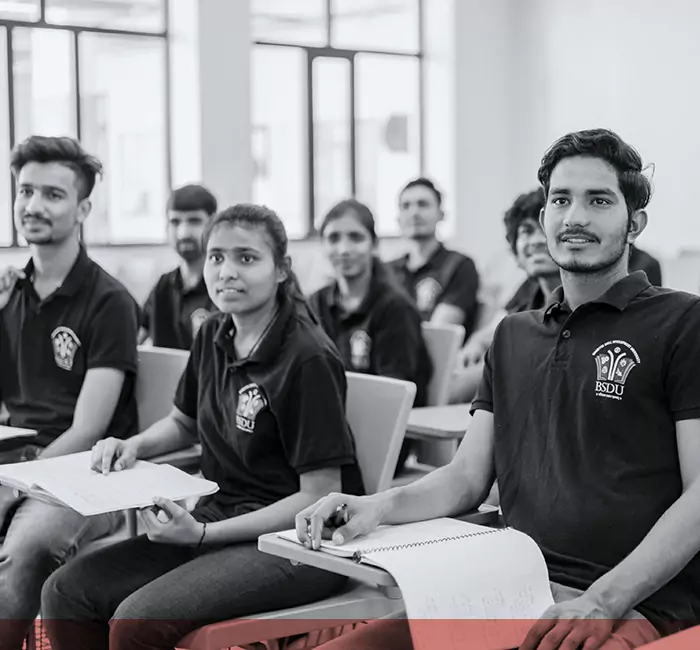
Examination Department
- |
- Overview
- |
- Process Handbook
- |
- Fees Information
- |
- Result
- |
- Schedule
- |
- Notices
- |
- Applications
- |
- IDs
- |
- Contact Team
Overview
Evaluation plays a pivotal role in the educational system.
To make assessment more meaningful, several aspects have been considered. With a focus on linking evaluation procedures with learning outcomes, the policy emphasizes a Learning Outcome-based framework to structure and link evaluation to University goals. It specifies the activities and assessment models required per examination policy to be followed at the University Level.
Taking a more comprehensive view of evaluation, this policy covers different types of assessments considering the requisite learning attributes. The evaluation procedures have been categorized into two major types - Continuous Assessment and End Semester Assessment. Emphasis has been laid on the major proportion of testing to be based on internal assessment modes.
Aligned with the Swiss Dual System of Education, the assessment of the students adheres to the principle that "those who teach should evaluate." While emphasizing the principles of modularization and in compliance with the UGC recommendations, a significant weightage is assigned to Continuous Assessment against the weightage assigned to End-Semester Assessment.

Examination Process Handbook
Information to the Students
Details of the Fees for different certificates and application forms:
| Student Diary (in case if lost) | Rs. 100/- |
|---|---|
| Certificate, Diploma, Advanced Diploma &P.G. Diploma | Rs. 100/- |
| Application Form For Backlog - Make-Up Examination | Rs. 1000/- (Per Course/Module) |
| Application Form For Detainees (Students With Less Attendance) - Make-Up Examination | Rs. 3500/- (Per Course/Module) and max Rs. 10000/- |
| Application Form For Re-Evaluation of Answer - Book (S) | Rs. 500/- (Per Course/Module) |
| Application Form For Issue Of Duplicate Grade Card | Rs. 500/- |
| Application Form For Issue Of Duplicate Degree | Rs. 2000/- |
| Duplicate Certificate, Diploma, Advanced Diploma & P.G. Diploma | Rs. 500/- |
| Courier/ Postage Charges For Grade Cards & Degree Certificate | Rs. 300/- |
| Re-register to repeat the semester (if student not promoted in next semester) | Rs. 10000/- |
| Certificate for Medium of Instruction | |
| Equivalence Certificate of CGPA with Percentage of Marks |
University Result
Click here to view University Results
Examination Schedule
- DATESHEET END SEM EXAM 2025-26 SUMMER_5TH SEMESTER
- End Semester Examination Schedule Session 2025-26 (Summer)
Notices
- Make-Up Examination Notice 2025-26 Summer
- Student Feedback Process
- Workplace Training Certificate Verification Process
- Modification to the Examination Schedule, 2024-25 Winter Semester
- Information regarding Students Diaries
Application Formats
- Authorization Letter
- No dues Application Format
- Issuance of Certificate/Diploma/Advanced Diploma/B.Voc/M.Voc Application Format
- Make-up (backlog) Examination Application Format
- Make-up (detainees) Examination Application Format
- Re-evaluation of Answer books Application Format
- Application Format for the less Attendance
- Application Format for issue of Duplicate Grade Cards
- Application Format for issue of Duplicate Degree
APAAR/ABC IDS
Contact Our Team

Dr. Rakesh Choudhary
Deputy Controller of Examinations
- deputy.coe@ruj-bsdu.in
- +91 141 6655440, Ext: 675


Ms. Alka Choudhary
Office Assistant-Examinations
- alka.choudhary@ruj-bsdu.in
- +91 141 6655440, Ext: 676
- Make-Up Examination Notice 2025-26 Summer
- Student Feedback Process
- Workplace Training Certificate Verification Process
- Modification to the Examination Schedule, 2024-25 Winter Semester
- Information regarding Students Diaries
Application Formats
- Authorization Letter
- No dues Application Format
- Issuance of Certificate/Diploma/Advanced Diploma/B.Voc/M.Voc Application Format
- Make-up (backlog) Examination Application Format
- Make-up (detainees) Examination Application Format
- Re-evaluation of Answer books Application Format
- Application Format for the less Attendance
- Application Format for issue of Duplicate Grade Cards
- Application Format for issue of Duplicate Degree
APAAR/ABC IDS
Contact Our Team

Dr. Rakesh Choudhary
Deputy Controller of Examinations
- deputy.coe@ruj-bsdu.in
- +91 141 6655440, Ext: 675


Ms. Alka Choudhary
Office Assistant-Examinations
- alka.choudhary@ruj-bsdu.in
- +91 141 6655440, Ext: 676